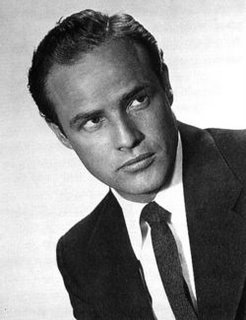Rosebud #341

I've always found it really hard to watch the films of Marlon Brando. Not because he's bad—he's the best—but because it's almost physically painful to watch him expose himself onscreen, in all his pain. Especially in On The Waterfront, which I think is his best role (sorry, Streetcar fans). Also I guess I was very much influenced by the great Truman Capote profile of Brando, The Duke In His Domain (read it here)—probably the best celebrity profile ever written, and the one which set the stage for everything else to come, including anything I myself have ever written (we all are imitators, quothe Kurt Cobain and Harold Bloom)—a story in which Brando comes across as a rather supercilious poseur. I'm not saying Capote was right, or wrong—it was his take on Brando, and it was powerful. But anyway, the other night I watched a TCM documentary on Brando, and learned something new about him. I never knew the extent of his activism for civil rights, Native American rights. It wasn't just some lip-service thing with him—he put his ass on the line, jeopardizing his career (as so few do today, in this "I have causes! Put me on the cover of People magazine!" age). Apparently after a certain point he didn't give a damn about acting or being a movie star (which he actually hated), only about drawing attention to injustice. It went very deep with him. Bobby Seele, the Black Panther, said Brando came the closest of any white man he ever knew to actually being a Black Panther. He called him a revolutionary. And a leader of the Native American activist community said Brando was the only white man he ever knew who, he felt, truly understood the Native American people's feelings (he also singlehandedly popularized the Native American movement in 1973, when he refused to accept his Oscar for The Godfather in protest of how Native Americans had been portrayed in film). I mean, these are very strong statements. Brando—who knew? He was cool.
<< Home